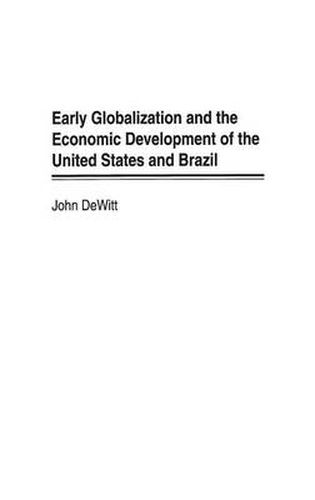Readings Newsletter
Become a Readings Member to make your shopping experience even easier.
Sign in or sign up for free!
You’re not far away from qualifying for FREE standard shipping within Australia
You’ve qualified for FREE standard shipping within Australia
The cart is loading…






Offering unique insights into globalization, economic development, and the histories of the United States and Brazil, DeWitt highlights the dramatically different consequences incorporated into the world economy for these two nations. Placing the controversial globalization process in historical context, DeWitt brings this increasingly important topic to life through the experiences of the two most populous states of the Western Hemisphere–Brazil and the United States. Comparing their development processes from the Colonial Era to 1900, he highlights the dramatically different consequences that are incorporated into the world economy for these two states. Sharing similar experiences during the Colonial Era, the countries’ internal differences and differing relationships with Great Britain, the economic superpower of the 19th Century, led to very different development paths. By 1900, the United States had become a member of the economic core, while Brazil remained mired in the semi-periphery. Pointing out the similarities and differences in the economic development of the United States and Brazil, DeWitt emphasizes that the manner of incorporation into the world economy greatly affected one becoming a superpower and the other remaining a developing nation. This book offers unique insights into globalization, economic development, and the histories of the United States and Brazil.
$9.00 standard shipping within Australia
FREE standard shipping within Australia for orders over $100.00
Express & International shipping calculated at checkout
Offering unique insights into globalization, economic development, and the histories of the United States and Brazil, DeWitt highlights the dramatically different consequences incorporated into the world economy for these two nations. Placing the controversial globalization process in historical context, DeWitt brings this increasingly important topic to life through the experiences of the two most populous states of the Western Hemisphere–Brazil and the United States. Comparing their development processes from the Colonial Era to 1900, he highlights the dramatically different consequences that are incorporated into the world economy for these two states. Sharing similar experiences during the Colonial Era, the countries’ internal differences and differing relationships with Great Britain, the economic superpower of the 19th Century, led to very different development paths. By 1900, the United States had become a member of the economic core, while Brazil remained mired in the semi-periphery. Pointing out the similarities and differences in the economic development of the United States and Brazil, DeWitt emphasizes that the manner of incorporation into the world economy greatly affected one becoming a superpower and the other remaining a developing nation. This book offers unique insights into globalization, economic development, and the histories of the United States and Brazil.